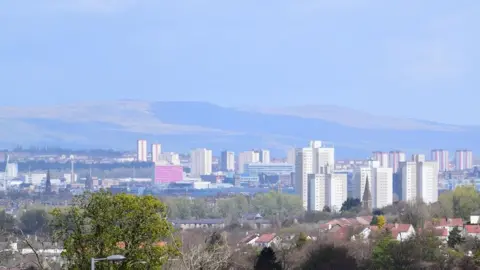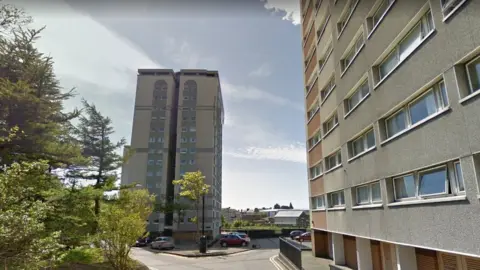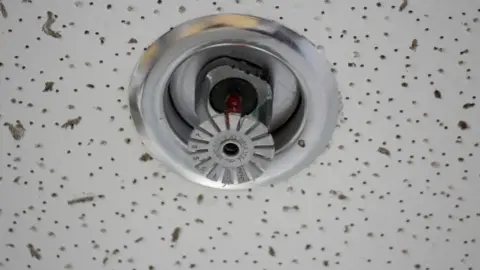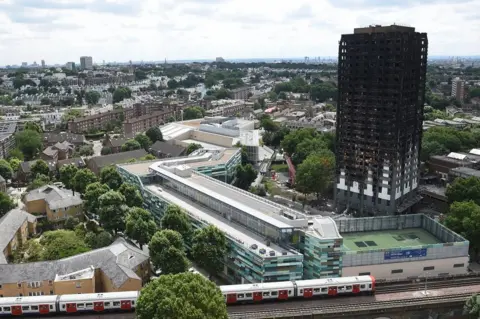No sprinklers in 300 Scottish tower blocks
 Getty Images
Getty ImagesThousands of homes in tower blocks across Scotland do not have potentially life-saving sprinkler systems, a BBC Scotland investigation has found.
There are no sprinklers in flats in more than 300 high-rise buildings in towns and cities across the country, including Glasgow and Edinburgh.
Every high-rise built in Scotland since 2005 must have sprinklers, by law.
But there is no obligation on councils or social landlords to fit the systems in older tower blocks.
There were no sprinkler systems in Grenfell Tower in Kensington, west London, when it was engulfed by a devastating fire last month that killed at least 80 people.
Social housing
It has led to renewed calls from firefighters and politicians to retrofit the devices in high-rise buildings.
And the Scottish government has pledged to review the evidence about the effectiveness of the systems.
An independent report published earlier this year found that sprinklers were 99% effective at controlling or extinguishing fires.
BBC Scotland contacted local authorities and housing associations across Scotland in a bid to determine how many high-rise homes were fitted with sprinklers.
Of those which replied to our request, only South Ayrshire Council said it had fitted the system into flats in its tower blocks.
They were fitted in 234 homes in three tower blocks in Ayr during a refurbishment of the flats in 2003.
 Google
GoogleFife Council, the City of Edinburgh Council and Glasgow Housing Association have sprinklers in their bin stores - a move being considered by Aberdeen City Council.
But there are no sprinklers in high-rise homes operated by the following social landlords:
- Aberdeen City Council (59 tower blocks)
- City of Edinburgh Council (48)
- Dundee City Council (10)
- Falkirk Council (13)
- Fife Council (12)
- Glasgow Housing Association (67)
- River Clyde Housing Association (Inverclyde) (13)
- North Ayrshire Council (7)
- North Lanarkshire Council (48)
- Perth and Kinross Council (6)
- Renfrewshire Council (14)
- West Dunbartonshire Council (22)
(South Lanarkshire Council has not yet supplied the information to BBC Scotland)
There is no suggestion that any of the councils or housing associations are breaching fire regulations and they have reassured tenants about fire safety in the wake of the Grenfell tragedy.
In response to the BBC Scotland inquiry, a number of landlords said they would act on any of the findings or recommendations made following the London fire.
Brian Sweeney, the former head of Strathclyde Fire and Rescue Service, called on the Scottish government to act to protect residents of high rise buildings north of the border.
He told BBC Scotland that the Grenfell tower fire was a "game changer" and added that he believed a sprinkler would have prevented the fire, which started in a fridge in a fourth floor flat, from spreading.
Public safety
"I think the Scottish government have led the way in requiring sprinklers since 2005 in both residential care homes and high rise blocks," he said
"What I want them to do now is go a little bit further and say they now want to work in partnership with the 32 local government authorities in Scotland, they want to prioritise the installation of sprinklers and they want to... to make sure these 300 high rises are fitted with sprinklers in each flat over the next three to five years.
"I think that's do-able. I think that would show a progressive approach to fire safety in Scotland. I think they could take lead in the UK in demonstrating exactly how important public safety is to them, and particularly how important the life safety of those who are most vulnerable is to them."
He added: "If you can put sprinklers in hotels, if you can put them in high rise premises and office premises and commercial premises, well lets take a look at those council estates where people are most vulnerable - like Grenfell - and let's make sure they get them as well."
 Getty Images
Getty ImagesThe BBC Scotland investigation also led to a call for action from Scottish Labour's deputy leader, Alex Rowley.
He said the Scottish government must agree to fund a programme to ensure the "highest safety standards" in all high rise flats.
Graham Simpson, the Scottish Conservative's housing spokesman agreed that the government should work with councils on a sprinkler installation system.
"That's what the people living there would expect, and it's something which has to happen immediately," he said.
The effectiveness of sprinklers - or fire suppression systems- was confirmed in an independent report published shortly before the Grenfell tragedy.
The study, which was commissioned by the National Fire Chiefs Council and the National Sprinkler Network found that they were 99% effective at controlling or extinguising fires when they operate.
Lead author Peter Wood, of Edinburgh-based Optimal Economics, told BBC Scotland he was confident of the effectiveness of sprinklers but he had "no idea" whether they would have prevented the Grenfell Tower fire.
He said they "very, very occasionally" do not work when they are overwhelmed by a fire but he dismissed concerns that sprinklers could be easily triggered, causing flooding, as a "myth".
"Sprinklers don't go off on a whim," he said. "They need heat to go off."
According to the Scottish Fire and Rescue Service, many sprinklers are only triggered by heats of around 68C - 11C higher than the highest temperature ever recorded in Death Valley in California.
In 2015 a report commissioned by the Scottish government which examined the "cost benefit analysis" of fitting sprinkler systems in homes across Scotland found that it would cost between £1,000 and £3,000 per flat.
It concluded that it was not cost-effective to fit sprinklers in individual houses, but a "targeted installation" would benefit at-risk groups.
People who live in deprived areas, those with drug and alcohol problems, or mental health problems, and elderly people are at greater risk from fire.
The Scottish government has confirmed that the provision of sprinklers will be considered in a review of fire legislation and building regulations - to which the fire service will contribute.
 EPA
EPAAssistant Chief Officer David McGown said: "The SFRS recognises the value these installations can add whilst acknowledging that they may not be appropriate in all cases when applied on a risk basis."
He added: "The Scottish Fire and Rescue Service works closely with local authorities and housing associations to help ensure the safety of occupants in high-rise buildings. The SFRS is here to support communities, most notably through our free home fire safety visits."
A spokesman for the Scottish government said: "While we continue to be confident that we have stringent building and fire safety regulations which contribute to keeping people safe, following the tragic events at Grenfell Tower it is imperative that we undertake a thorough and critical review of our regulations.
"The Ministerial Working Group overseeing this process will consider all relevant measures to ensure the safety of residents in high-rise domestic buildings, including a review of evidence on fire suppression systems."
